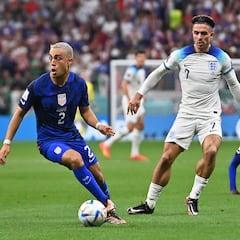Mauricio Pochettino found Dele Alli’s heartbreaking interview “really, really painful”
The new Chelsea boss helped the Englishman develop into one of the Premier League’s most talented young players and the pair still share a close bond.


Mauricio Pochettino admitted that he found Dele Alli’s recent interview with Gary Neville “so painful” after his former player revealed that he had been abused as a child.
The new Chelsea manager brought a young Dele into the first team at Tottenham Hotspur and helped him become one of the most exciting young players in Europe.
Dele was twice named the PFA Young Player of the Year but has suffered a decline in form in recent years. In an interview on Neville’s The Overlap podcast, Dele revealed that he had been suffered the consequences of a traumatic childhood.
In an interview with ESPN Pochettino, who still shares a close relationship with the player, said that he had found the interview incredibly difficult viewing.
“Of course, it was really tough for me to see him,” Pochettino said. “I didn’t finish the interview because it was so painful. He knows how we love him, how important he is for us as a person.”
I’m struggling to find the words to put with this post but please watch my most recent interview with Dele. It’s the most emotional, difficult yet inspirational conversation I’ve ever had in my life. Watch the interview on @wearetheoverlap here https://t.co/60d4IZwQmR pic.twitter.com/0cZowJGW77
— Gary Neville (@GNev2) July 13, 2023
Pochettino is currently on tour with new team Chelsea in the United States, while Alli is preparing to return to Everton for pre-season training. When he is back in the UK, Pochettino hopes to meet up with the 27-year-old.
“Like a player, he was amazing but like a person he has a big, big heart. And of course, we are in contact. After the USA tour I hope to see him in London, to meet him and give him a big hug.”
“Always, it is tough when you love a person but they show in an interview like this, it is really, really painful. But he is a strong, unbelievable guy and for sure he will become stronger.”
Pochettino is far from the only figure to speak out in support of Dele, former England teammate Wayne Rooney said that he hopes that the interview will help to reframe how footballers are treated in the public domain.
Related stories

Dest could leave LaLiga champions
“I think these days if any player is feeling [mental health stresses] or has problems, the support is out there for them,” Rooney told The Times. “There is no reason for shame or to hide their issues, because all that support and help is there.”
“It’s another example of how people are too quick to judge at times. You don’t know people as human beings. You don’t know what a person is going through.”